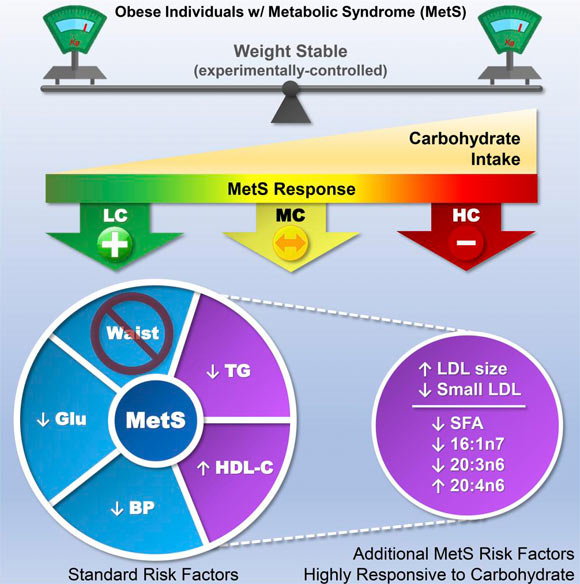A new study published in the Journal of Clinical Investigation Insight shows that metabolic syndrome — a cluster of factors that also put people at higher risk of heart disease and stroke — can be rapidly (within 4 weeks) reversed by a low-carb diet in the majority of people even if they don’t lose any weight.

After eating a low-carb diet, more than half the participants saw their metabolic syndrome reversed even though they were fed diets that intentionally contained enough calories to keep their weight stable. Image credit: Hyde et al, doi: 10.1172/jci.insight.128308.
“There’s no doubt that people with metabolic syndrome and type 2 diabetes do better on low-carb diets, but they typically lose weight and one of the prevailing thoughts is that the weight loss is driving the improvements. That was clearly not the case here,” said Ohio State University’s Professor Jeff Volek, senior author of the study.
“Our view is that restricting carbs even without weight loss improves a host of metabolic problems. Obviously, quality of diet matters because quantity is locked down in this experiment.”
Professor Volek and colleagues wanted to know what happens to obese people with metabolic syndrome when they eat a diet low in carbohydrates but don’t shed any pounds.
Over about four months, each of 16 study participants ate three month-long controlled diets — high-carb, moderate-carb and low-carb — with a two-week break between diets.
All three diets had 20% protein. The low-carb diet was 6% carbs and 74% fat, the moderate-carb diet was 32% carbs and 48% fat, and the high-carb diet was 57% carbs and 23% fat.
The researchers ensured that the participants would not lose weight by providing them with pre-prepared meals that contained an amount of calories equal to their energy expenditure.
After eating the low-carb diet, the participants had a variety of significantly improved health measures, particularly lower triglycerides and improved cholesterol readings.
“Despite the fact that the low-carb diet contained 2.5 times more saturated fat than the high-carb diet, it decreased saturated fat in the bloodstream and was associated with an increase in the size of cholesterol particles in the blood, which decreases the risk of cardiovascular disease,” said study first author Dr. Parker Hyde, also from Ohio State University.
The scientists found evidence of increased fat-burning efficiency after a low-carb diet and an improvement in blood sugar.
They did not see statistically significant improvements in blood pressure or insulin resistance.
Three participants no longer had metabolic syndrome after the moderate-carbohydrate diet and one no longer had the syndrome after the high-carb diet.
“These results are likely explained by the fact that even these study diets — particularly the moderate-carb diet — represented a shift toward fewer carbs for study participants,” Professor Volek said.
“Even a modest restriction in carbs is enough to reverse metabolic syndrome in some people, but others need to restrict even more.”
_____
Parker N. Hyde et al. 2019. Dietary carbohydrate restriction improves metabolic syndrome independent of weight loss. JCI Insight 4 (12): e128308; doi: 10.1172/jci.insight.128308







